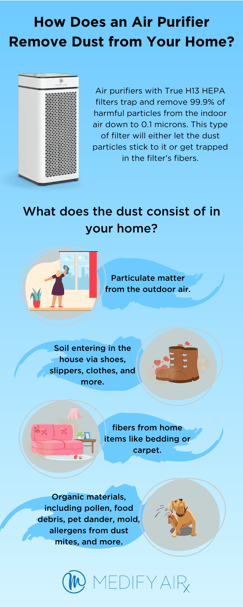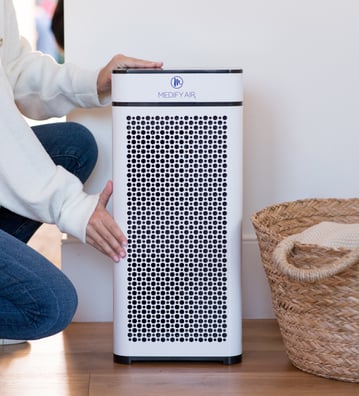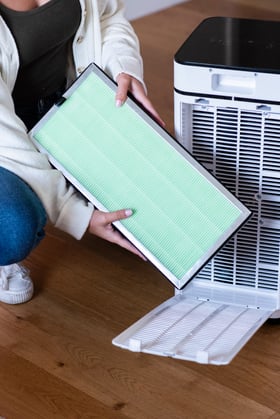So, you ran your finger through the side table in your bedroom, shocked by how much dust has accumulated. Your finger is quite literally caked with dust! You probably went to wash your hands and wipe the surface of the side table, realizing that this should be a consistent ritual now. But why?
All the dust you found on the side table, believe it or not, is circling through the air. A dust cloth alone isn’t going to do the trick here, but there might be another solution to remove dust from your home! Just keep reading.

You keep your home pretty clean as is, right? Well, you might be surprised to know that there are so many other places and things in your house that need a dust wipe. It may add hours to your list of chores to keep wiping down all of those surfaces as the dust is still lingering in the indoor air.
So, how can you remove these dust particles once and for all without an extra few hours of cleaning each week? Your best bet is to purchase some air purifiers for your home.
But a question still lingers over your head! Does an air purifier really remove dust from the indoor air, and if so, how does it do it? And does the price outweigh the price of your time spent cleaning? The answer to this question will certainly determine your buying decision.
Now, this blog post is all about why and how an air purifier might just be able to do the job for you. Let’s take a quick look at what dust is made of and how it can affect your health.

What does the dust consist of in your home?
So many of us assume that dust is all about soil, dirt, and dead skin cells, but that is not necessarily the case.
According to a study published in Environmental Science & Technology in 2009, dust is much more than just dirt and dead skin cells. It primarily consists of the following:
- Particulate matter from the outdoor air.
- Soil entering the house via shoes, slippers, clothes, and more.
- Organic materials.
- Fibers from house items like bedding or carpet.
The study divides the organic materials and includes the following:
- Pollen
- Food debris
- Dead skin particles
- Pet dander
- Mold
- Allergens from dust mites
- Insect body parts

How can dust affect your health?
As you may already know, dust can severely affect your overall health. The respiratory system is the most impacted by poor indoor air quality, and those with a dust allergy will have the most difficulty breathing in a dusty home.
Here are the symptoms of a dust allergy:
- Difficulty breathing, whizzing, coughing, sneezing, and overall irritation in the airways.
- Skin irritation, itchy nose and eyes, followed by watery nose and eyes, and even rashes.
- Decreased lung function.
- If you have a chronic lung condition, such as asthma or COPD, dust can exacerbate your symptoms.
- Increased risk of stroke and heart attack in highly susceptible people.
Do air purifiers help remove dust from indoor air?

The answer is a resounding yes! Air purifiers for homes and offices can successfully remove dust from the indoor air. So, if you are thinking of buying an air purifier for your home, you are on track for a healthier life and a cleaner home.
How does an air purifier remove dust from indoor air?
Knowing how an air purifier actually removes dust from the air can help you choose the best air purifier for your home.
There are so many air purifiers available online and in store, but an air purifier you can trust will use mechanical filtration methods, such as flat filters or HEPA filters. These mechanical filters will either let the dust particles stick to it or get trapped in the filter’s fibers.
Your typical HVAC system should have flat filters, and an advanced air purifier will have a HEPA filter.
HEPA filters should remove dust and other particulate matter, but only True H13 HEPA filters or better trap and remove 99.9% of harmful particles from the indoor air down to 0.1 microns.
But there are more things you should consider as you shop for an air purifier! In addition to True H13 HEPA filtration, you should seek a purifier that has activated charcoal filters.

Activated charcoal filters will absorb odors from the indoor air, which is perfect for those of us with babies, toddlers, or dogs.
So, when you are ready to buy an air purifier to keep the air in your home fresh, opt for one that has a mechanical filtration (HEPA and activated charcoal filters) system.
Bottom Line
Even if you take pride in how clean you keep your home, you aren’t alone in having a home full of dust, dander, and other harmful particulate matter.
Removing dust and other harmful particles is critical to you and your family’s health. Plus, who doesn’t want to come home to a breath of fresh air?
A top of the line air purifier with True H13 HEPA filters and activated charcoal filters will help you keep the maximum amount of space in your home clean!
At Medify Air, we provide a wide range of air purifiers for homes, offices, and many different commercial spaces. Our air purifiers have True H13 HEPA filters, Ozone-Free Ionizers, activated charcoal filters, a variety of fan speeds, and more special features.
View our product offerings on our website or contact our sales team to get recommendations that are best for your unique needs!